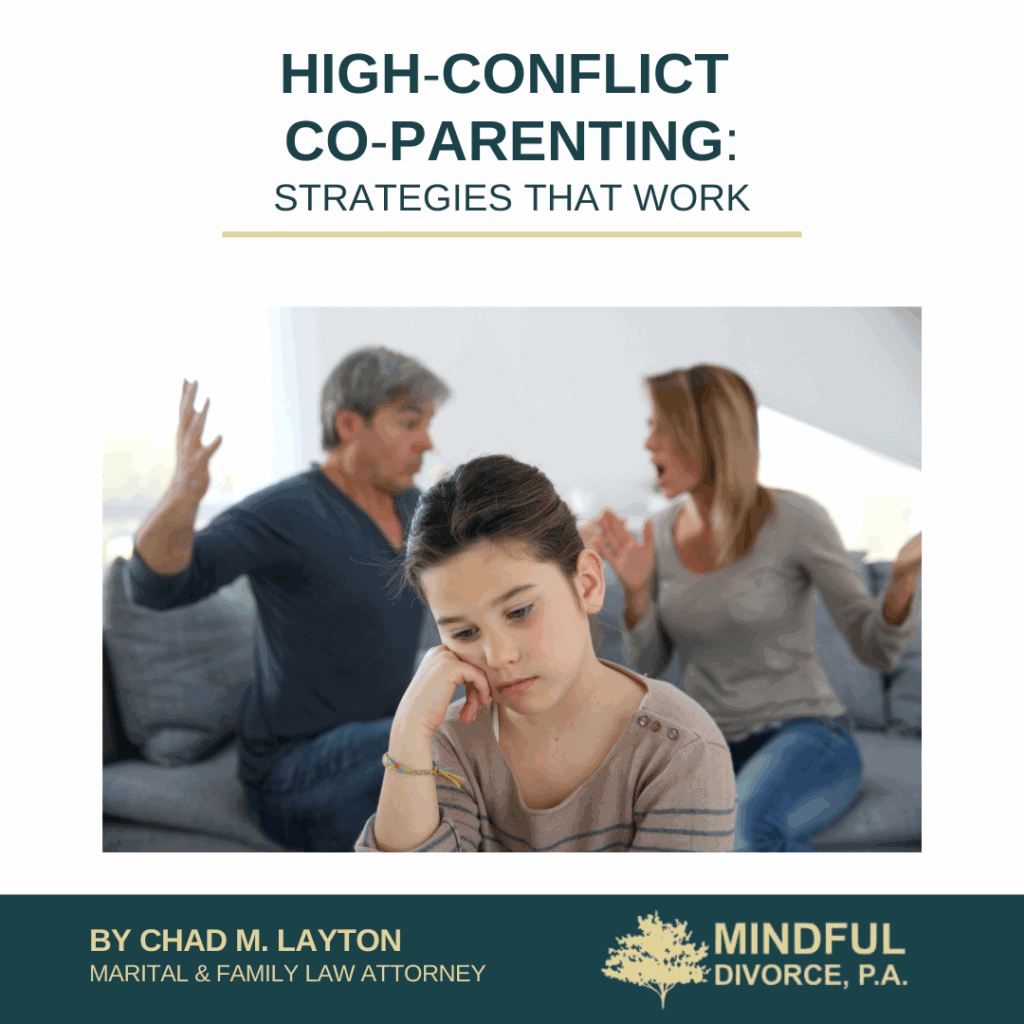
High-conflict co-parenting wears people out, even strong parents who love their kids. Arguments pop up over tiny things, then spill into school, doctors, and weekends. At Mindful Divorce, P.A., we focus on peace of mind through clear, fixed-fee services, so you can plan for your family without worrying about surprise bills. In this article, we share practical, Florida-focused tools and habits that help you steady the ship and give your children a calmer day-to-day life.
Identifying High-Conflict Parents
High-conflict parents often struggle to resolve even small disputes. One parent might push decisions through, then the other digs in, and nothing moves. Children feel the tension first.
Sometimes, one parent undermines the other’s relationship with the child. This can look like bad-mouthing, blocking calls, or making the child feel guilty for enjoying time with the other parent. Over time, kids may start to pull away from a parent they once adored.
Watch for patterns like these:
- Endless arguments over exchanges, school events, or medical choices.
- Disparaging comments about the other parent in front of the child.
- Refusal to follow the parenting plan, late drop-offs, or repeated schedule games.
- Using the child to pass messages or to pressure the other parent.
- Frequent emergency court filings that could have been avoided with structured communication.
If several of these sound familiar, it is time to tighten the structure and bring in tools that lower the heat.
Legal Tools for Managing High-Conflict Co-Parenting
Florida law gives families several ways to reduce conflict, protect the child’s relationship with both parents, and keep cases on track. The right mix depends on your facts, your child’s needs, and what the court has already ordered.
Parenting Plans
A strong parenting plan sets out time-sharing, how parents will communicate, and how major choices get made. Florida Statute 61.046 explains what a parenting plan covers, including school, healthcare, and daily tasks. The clearer the terms, the fewer openings for arguments.
Parents in high-conflict cases tend to benefit from precise provisions, such as exchange locations, app-based messaging only, and steps to resolve urgent issues. Well-written plans give children stability, which lowers stress at both homes.
Parenting Coordinators
Parenting coordinators help families stick to the plan and solve day-to-day disputes before they explode. They also coach parents on better communication and help reduce the child’s exposure to conflict. Florida has rules for coordinator training and court appointments that guide who can serve and how they work with the court.
Courts often appreciate the practical feedback a coordinator can provide. In many high-conflict cases, early use of a coordinator saves time, money, and heartache.
Guardians ad Litem (GAL)
A Guardian ad Litem investigates the child’s situation and makes recommendations to the judge. Florida Statute 61.403 describes how GALs are appointed and what they do. In cases that hint at parental alienation or heavy pressure on a child, a GAL can bring the court a clearer picture.
The GAL’s focus stays on the child’s well-being. Their reports can help the court cut through the noise and put guardrails in place.
Court Intervention and Modifications
When orders are ignored, you can ask the court to enforce them. If life has changed in a big way, you can also request a modification to the parenting plan. Judges in Florida do not brush aside conduct that harms a child’s bond with a parent.
Bring records, keep your requests focused, and tie each ask to the child’s day-to-day stability. This makes it easier for the court to act.
Comparison of Legal Tools for High-Conflict Cases:
| Tool | Purpose | Who Is Involved | Good For | Florida Reference |
| Parenting Plan | Defines time-sharing, decision-making, and communication | Parents, court | Clarity on schedules and responsibilities | F.S. 61.046 |
| Parent Coordinator | Implements plan and resolves day-to-day disputes | Parents, court-appointed coordinator | Ongoing conflict reduction and skill building | Florida rules on coordinator qualifications and appointments |
| Guardian ad Litem | Investigates and recommends to the court | GAL, parents, child | Alienation concerns, contested facts | F.S. 61.403 |
| Enforcement or Modification | Enforces orders or updates the plan | Parents, court | Noncompliance or major life changes | Family law procedures and case law |
Strategies for Effective Communication with a High-Conflict Co-Parent
Structure beats drama. When you control how you communicate, most arguments shrink and some disappear.
Utilize Communication Apps
Use a co-parenting app like OurFamilyWizard, TalkingParents, AppClose, or 2Houses. These tools store messages, calendars, and expense records in one secure place. Time-stamped logs reduce the he-said, she-said problem and create a record the court can trust.
Many apps also flag tone problems and keep everything searchable. That alone can cool things down.
Maintain a Business-Like Tone
Write short, factual messages, like you would at work. Stick to dates, times, and child-centered needs. Avoid sarcasm, threats, or side comments.
This style sends a clear signal: We are here to parent, not to fight.
Asynchronous Communication
Skip live phone calls and heated face-to-face talks when you can. Written messages let you slow down, think, and respond when calm. They also provide documentation if issues return later.
Silence for a short time is not surrender. It is choosing the better reply.
Set Clear Boundaries
Pick two daily windows to check and respond; for example, 9 a.m. and 6 p.m. Outside of true emergencies, stick to those times. Limit topics to the children and the plan.
Boundaries protect your energy and keep co-parenting out of your entire day.
Focus on the Children
Keep every conversation tied to the kids, their schedule, health, and school. If the chat drifts into the past, pull it back. A simple line helps: “Let’s keep this about pick-up time and soccer.”
Kids feel safer when parents keep the main thing the main thing.
Learn to Let Go
Not every jab needs an answer. Let minor slights pass and save your replies for issues that affect the child’s time, safety, or school. Routines at your home add predictability even if the other parent will not match it.
Small wins stack up. Your child notices more than you think.
Quick habits that lower conflict fast:
- Use one app for all messages, calendar changes, and receipts.
- Reply with three sentences or fewer unless a longer reply is needed.
- Confirm agreements in writing, even after a quick call.
- Keep a private log of missed time or late arrivals, with dates and screenshots.
These steps seem simple, yet they make a real dent in daily stress.
Parallel Parenting as an Alternative Approach
Parallel parenting is a structured setup for parents who cannot communicate well. Each parent runs their own home during their time, with little direct contact between parents. Communication is limited, usually through an app or short written updates.
The goal is to lower the child’s exposure to arguments while keeping both parents active. When coordination creates conflict, separation of roles brings peace. Over time, some families move from parallel parenting back to lighter co-parenting as tempers cool.
To make it work, your plan should spell out exchanges, school notice rules, healthcare updates, and when a neutral tie-breaker is used. Clear terms reduce friction points.
Emotional Well-being and Support
High-conflict co-parenting is exhausting. Line up support where you can, such as a therapist, mediator, or parenting coordinator. Having a steady guide helps you keep your responses grounded.
Children also benefit from therapy, especially if they feel torn or anxious about showing love to both parents. A child-centered counselor can give them words, tools, and a safe place to breathe.
If a parent-child relationship has frayed, consider family therapy with a reunification focus. Done well, it can rebuild trust without blaming the child for pulling away in the storm.
Ways to strengthen your support system:
- Set one standing therapy hour for yourself each week, even if things seem calm.
- Ask the school counselor to be a point of contact for updates on mood and behavior.
- Share the parenting plan with your child’s providers so everyone pulls in the same direction.
Healing takes time, and that is okay. Consistency is your friend here.
Find Balance with Mindful Divorce, P.A.
High-conflict co-parenting does not have to run your life. At Mindful Divorce, P.A., we use clear steps and fixed-fee services to bring order, protect your child’s routine, and reduce flare-ups. We care about practical outcomes that help your family today and next season, too.
If you want a plan that fits your situation and a steady team in your corner, reach out. Call 561-537-8227 or visit our Contact Us page to set up a consultation. We welcome your questions, and we are ready to talk through options that can bring more calm to your home.



